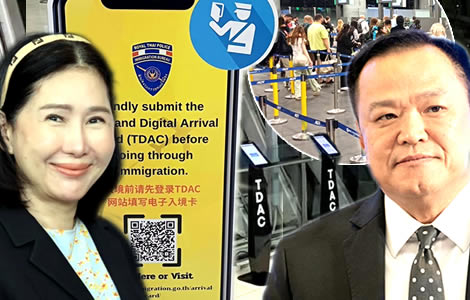Travellers urged to use smartphones to submit TDAC forms on arrival as the Immigration Bureau offers help at airports. Meanwhile, Interior Minister Anutin pushes for a new centralised Immigration Department to tackle crime, delays and overlapping agency roles.
On Saturday, the Immigration Bureau advised that travellers arriving in Thailand without completing the new Thailand Digital Entry Card (TDAC) form should use their smartphones—if connected to mobile internet—to submit the required information. The rollout of the new security screening system earlier in the week reportedly went smoothly, with the Ministry of Tourism and Sports’ permanent secretary, Natthriya Thaweevong, reporting a 90% completion rate as of Thursday. To support those unable to complete the form in advance, the Immigration Bureau installed assistance terminals in the arrivals hall before the immigration checkpoint and provided on-site help for travellers lacking technological access. The initiative coincides with a wider reform proposal from Interior Minister Anutin Charnvirakul, who this week suggested that immigration matters in Thailand should be centralised under a single minister through a new Department of Immigration.

The Immigration Bureau on Saturday suggested that incoming passengers to Thailand, who have smartphones with eSIM cards, purchase local phone services. In turn, this would also enable them to complete the country’s Thailand Digital Entry Card (TDAC) information. An Immigration Bureau official said that this can be done even after landing and before proceeding through Immigration.
Additionally, the Immigration Bureau has installed TDAC kiosks at the airport to allow passengers who have not yet complied with the requirement to do so.
TDAC site reports issues and long queues but 90 percent of passengers now complete the form before arrival
On May 1st, the permanent secretary of the Ministry of Tourism and Sports, Natthriya Thaweevong, said that some 90% of travellers had completed the form before landing.
In the days after the new screening system was introduced, it is reported to have gone relatively well. However, there have been problems.
At one stage on Thursday, some users reported issues with the Immigration Bureau’s Thailand Digital Entry Card (TDAC) site, which appeared to be overloaded. Afterwards, it appeared to have been rectified.
In addition, the requirement has caused significant queues at the airport as passengers who have not completed the form scramble to comply. The Immigration Bureau has provided assistance at airports to help travellers in these opening days of the new system.
Before it was introduced on May 1st, the country’s National Police Chief said it would help significantly with weeding out undesirables infiltrating in Thailand. General Kittirat Phanphet said that data would be linked with the Immigration Bureau and police databases to allow for a more effective security response.
Interior Minister proposes creating a new Immigration Department to unify oversight under one ministry
The introduction of the new system came in the same week that the Minister of the Interior, Anutin Charnvirakul floated the idea of creating a separate Department of Immigration.
Deputy Prime Minister Anutin suggested that the new department should be under the Interior Ministry. Presently, this ministry is ultimately responsible for the 1979 Immigration Act.
Later, Minister Anutin said that at this time he was only calling for a study. He suggested that a combination of relevant agencies from the police, Tourism Ministry, Labor Ministry, and Interior Ministry under one new department would be more effective.
This comes as Thailand faces significant challenges from massive infiltration by Chinese criminal mafia groups, not just into criminal activities but more notably into legitimate businesses such as transportation, logistics, construction and of course, tourism.
Deputy Prime Minister and Interior Minister Anutin in particular proposed the creation of a dedicated department. On Wednesday, Mr Anutin submitted a formal proposal to the Chairman of the Immigration Commission. He urged the formation of a subcommittee to assess the feasibility of such a move.
Proposed department aims to improve border control and better manage cross-border human movement
He said the new department would better address the growing cross-border movement of both Thai citizens and foreign nationals. Presently, immigration responsibilities are spread across many agencies, leading to overlapping roles and inefficiencies.
Mr Anutin emphasised that the Interior Ministry already handles a wide range of responsibilities linked to national security and public welfare. These include civil registration, work permits, residency approvals and citizenship applications.
Significantly, he noted the ministry manages a vast population database. With upgrades, this system could support faster and more integrated immigration services. Moreover, he said improving the existing digital infrastructure would be more cost-effective than building a completely new system.
This proposal follows a recent government directive assigning the Interior Ministry to lead efforts to merge population databases with public services. According to Mr Anutin, this integration would modernise public administration while boosting service speed and efficiency.
Furthermore, he pointed out that centralising immigration functions would also support Thailand’s national security goals. The Interior Ministry, he said, is well-positioned to lead this change because of its legal mandate and administrative reach.
Anutin cites earlier cabinet resolution that gave Interior Ministry broader immigration oversight authority
Mr Anutin linked his proposal to a cabinet resolution passed on January 10, 2017. That resolution gave the prime minister and interior minister power to issue regulations under the Immigration Act. Subsequently, this led to a widespread crackdown on visa abuse.
It also appointed the permanent secretary of the Interior Ministry as the chair of the Immigration Commission. At that time, the Office of the Public Sector Development Commission (OPDC) was tasked with studying the potential impact of forming an immigration department.
The cabinet later approved the OPDC’s findings in principle. This paves the way for further planning and discussion. In recent meetings, the OPDC and Interior Ministry held joint discussions to revisit the concept.
During those talks, the ministry presented details about its existing functions and its capacity to handle integrated border management. As Mr Anutin explained, a centralised immigration agency would help improve coordination across ministries and strengthen law enforcement.
Fragmented immigration system blamed for delays and weak coordination across nine different Thai agencies
He said the current structure is too fragmented to handle today’s complex immigration demands. At present, immigration responsibilities are divided among at least nine agencies. These include the Interior Ministry, Foreign Affairs Ministry, Royal Thai Police, and Labour Ministry.
Other key bodies involved are the Office of the Attorney General, the National Security Council, the Board of Investment and the Tourism Authority of Thailand.
The Immigration Bureau, which operates under the Royal Thai Police, also plays a leading role. However, the lack of a lead agency has created major administrative gaps. According to Mr Anutin, this causes delays in services and weakens cooperation between departments.
For example, there is no single mechanism to manage visa processing, data sharing, and enforcement. Therefore, he said, a new department would offer a clear structure for handling immigration policy and operations.
It would allow agencies to collaborate more efficiently and respond quickly to emerging threats or trends. Thailand, he added, is facing new challenges linked to mass migration and rising international mobility.
Rising mobility and transnational crime driving need for a proactive digital immigration oversight model
Notably, many travellers now arrive with complex legal statuses, including digital nomads, long-stay retirees, and short-term workers. At the same time, illegal immigration, human trafficking, and transnational crime are growing concerns.
Thus, Mr Anutin argued that immigration control should shift from reactive management to proactive oversight. In his view, the Interior Ministry’s experience with population records and digital systems makes it a natural leader for this effort.
TM6 goes off well but officials and Tourism Minister warn of industry in ‘crisis.’ Blame foreign media
Police Chief says new TM6 online will boost security in Thailand for good tourists and make it far safer
He said this would reduce duplication and help the country adapt to global migration shifts.
As a next step, the proposed subcommittee would be responsible for reviewing all legal, technical, and budgetary requirements. It would also consult with stakeholders across the government and submit its findings for cabinet approval.
Although still in the early stages, Mr Anutin said momentum is growing for reform.
He added that the government is committed to improving service delivery and protecting national interests. Indeed, he called the proposal a necessary step for modernising Thailand’s immigration system and safeguarding its borders.
Join the Thai News forum, follow Thai Examiner on Facebook here
Receive all our stories as they come out on Telegram here
Follow Thai Examiner here
Further reading:
Thaksin does not rule out joining talks in US as Thai team finalises plans. They fly out on Thursday
Trump’s remaking of World trade, if it works, will force Thailand to decide between the US and China
US offers a 90-day tariff pause but Thailand must move faster as it already faces shaved GDP in 2025


















